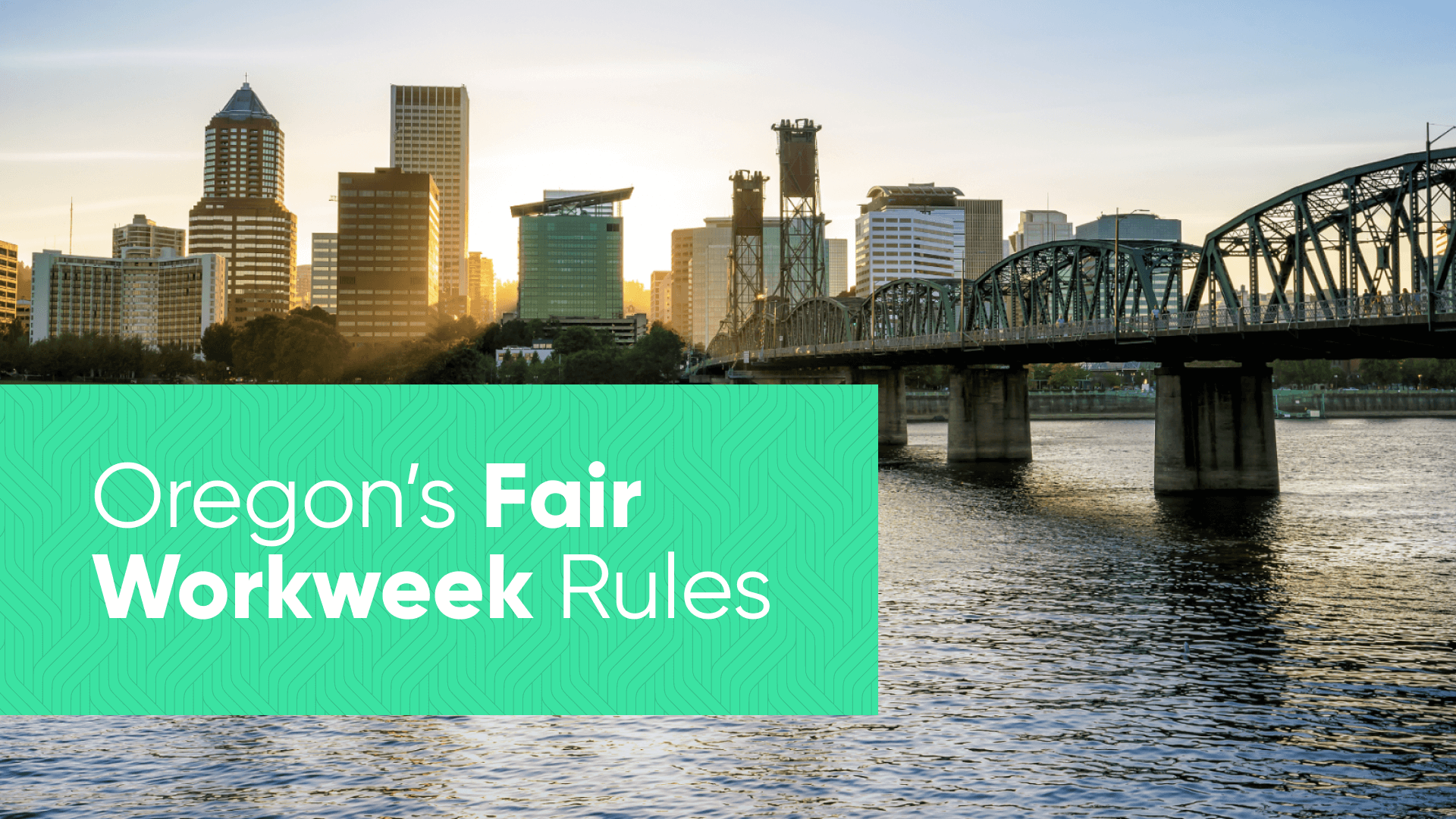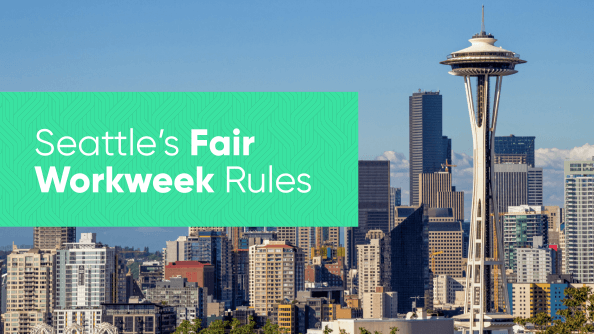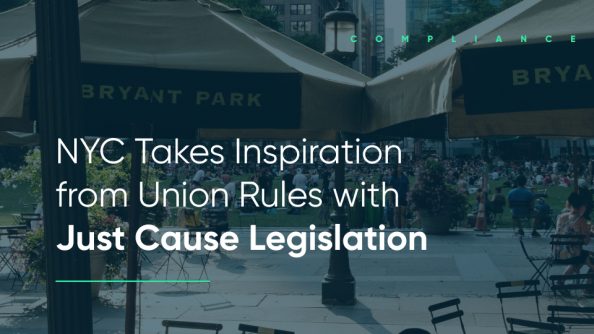Here’s What You Need to Know About Oregon’s Fair Workweek Rules and Predictive Scheduling Policies

- By Harri Insider Team | April 29, 2021
Stay in Compliance with Predictive Scheduling Regulations in 2024 and Beyond
As the first state to enact Fair Workweek laws, Oregon paved the way for predictable workplaces for hourly employees by protecting workers from inconsistent and unfair scheduling practices. First taking effect in July 2018, this legislation was updated in 2020, and remains in effect across the state as of February 2024.
Yet despite its good intentions, even today Fair Workweek predictive scheduling laws have proven to be a massive operational hurdle and a compliance challenge for most hospitality businesses.
Oregon Fair Workweek and predictive scheduling laws apply to hospitality, food service, and retail businesses with at least 500 employees worldwide.
One thing that makes Oregon Fair Workweek unique is its voluntary standby lists, which give operators a bit more flexibility and an opportunity to decrease labor costs. We’ll cover this and other Oregon Fair Workweek requirements below.
For operators affected by the rules, it’s important to stay on top of the paperwork. But restaurant schedules are difficult enough to plan at the best of times. An all-in-one HCM platform is the best way to ensure Fair Workweek compliance, improve labor efficiency, and give managers their time back.
Oregon Fair Workweek Requirements: Predictive Scheduling, Right to Work and more
Most Fair Workweek requirements revolve around the employee schedule, and Oregon is no exception. Hospitality businesses operating out of Oregon must be aware of the following requirements.
Advanced notice scheduling and changes to posted work schedules
Oregon Fair Workweek requires that employers post team written schedules at least 14 days in advance and via digital means. This rule aims to protect employees from last-minute schedule changes.
If changes are made to an employee’s schedule after the advanced notice window has passed, they are entitled to premium payments for each individual violation.
Some exemptions will not incur premium payments:
- Schedule changes amount to 30 minutes or less
- An employee requests a last-minute schedule change in writing
- An employee on a voluntary standby list is called in last-minute
- Two employees agree to swap shifts with one another
- Hours are subtracted for disciplinary reasons
- Health, safety, or event changes out of an employer’s control requires schedule changes
Employees may request in writing to work additional shifts or on-call work shifts any time after the notice is given.
Right to rest scheduling periods
Right to Rest laws are designed to discourage the scheduling of “clopenings” shifts.
Oregon Fair Workweek requires employee schedules to have at least a 10-hour window in-between shifts unless given explicit consent.
If an employee does work a clopening shift, they must be compensated at 1.5x the employee’s regular rate of pay.
Good faith estimates of employee schedules: predictive scheduling for employees
Good faith estimates give employees advance knowledge of when and where they are expected to work.
Oregon Fair Workweek requires employees to be given a good faith estimate containing:
- Median hours they’re expected to work for the month
- Details of the voluntary standby list and how that process works, if applicable
If an employee’s schedule experiences significant, consistent change from what was outlined in their good faith estimate, their GFE document should be updated to reflect new schedule requirements.
Right to provide scheduling input
Employees may suggest changes to the work schedule and may request not to be scheduled for work shifts during certain times or at certain locations.
While employees aren’t required to accept these requests, they’re not allowed to retaliate against employees for making them.
Voluntary standby lists
Voluntary standby lists offer employers more flexibility and decrease the chances of overstaffing operations.
While not required, employers may keep a list of employees that are willing to work “on call.” This list allows employers to call employees in last-minute to handle rushes of customers or to cover an unexpected employee absence. Employers must allow employees to easily be taken off the voluntary standby list.
Because this list is made up of volunteers, calling in an employee from the voluntary standby list will not incur premium payments.
Employers are strictly forbidden to force or coerce employees into joining the voluntary standby list.
Restaurant scheduling is a balancing act., and creating labor-efficient schedules is difficult enough for managers without Fair Workweek. Keeping up with these legal requirements, ensuring schedules for every employee is compliant, and keeping track of premium payments while managing a team of 20+ employees is near impossible. And if they do manage to accomplish that (kudos!), your service output will decline as a result of a non-present manager.
Tech-based solutions are the new must-have to ensure labor efficiency and full Fair Workweek compliance for Oregon businesses. All-in-one compliance platforms like Harri take the burden out of Fair Workweek by preventing unnecessary violations and empowering managers to proactively handle predictive scheduling requirements.
See how Harri can work with your existing operational processes to keep your team members compliant.
An intelligent scheduling solution is the best way to ensure full compliance with Oregon’s Fair Workweek labor laws.
Harri’s data-driven scheduling platform fully integrates with all HCM processes for complete transparency into labor demand, spend, and Fair Workweek-compliant scheduling options.
Smarter scheduling is key to keeping labor costs low while navigating Fair Workweek. Demand-based scheduling empowers managers to know when they can expect the most customers down to the week, day, or even day-part. Position-based scheduling helps teams with a diverse range of skillsets fit demand needs in a way that’s most labor efficient.
During the scheduling building process, Harri’s compliance safeguards warn managers of potential compliance breaches or prevent them altogether. These safeguards are location-based, meaning they’ll automatically update to fit your store location’s specific Fair Workweek requirements.
As managers generate schedules, all scheduling-related labor costs are updated in real-time, including Fair Workweek-related premium payments. Once the schedule is published, employees receive written notification as required by Oregon Fair Workweek requirements.
And if an employee needs to call out sick, Harri empowers your team to utilize shift swaps to fill labor gaps without incurring premium payments. An employee releases their shift (tying the action to them rather than you, the employer) and notifications are sent to applicable substitutes. If another team member opts to take the shift, a manager will be notified to approve the change.
Because this process is entirely employee-driven, it does not incur Fair Workweek-related premium payments.
Real-time non-compliance alerts
Even the most perfect schedule is bound to undergo changes, and those changes will result in Fair Workweek premium payments. Harri keeps a finger on the pulse of all non-compliant actions so your managers can focus on serving up a great guest experience.
If a manager mistakenly schedules a clopening, for example, Harri will send a notification warning them that the shift will require employee consent and a premium payment. If the 14-day advanced schedule period is approaching but a schedule still hasn’t been posted, Harri will send a reminder. If managers try to make changes to an already-posted schedule, they’ll get flagged that each change results in a premium.
Not only do these flag potential compliance violations, but they empower managers to choose to pay premiums when absolutely necessary — which is more often than most operators expect!
Why else is this important? Hospitality businesses without a Fair Workweek compliance strategy often pay premiums to employees even when they aren’t entitled to one as a way to proactively prevent non-compliance — that or they have a misunderstanding of what scheduling actions result in premiums.
Because Harri is your compliance expert it prevents unnecessary labor spend so every shift counts.
Create a voluntary standby list for hourly employees
Harri’s Oregon-specific voluntary standby list tool simplifies the process of creating compliant on-call lists.
Once the voluntary standby list is enabled, employees are free to opt into and out of the list via their Harri login as they please — fulfilling the “voluntary” requirement of this law.
When managers need to call in a team member last minute, they can easily see which employees are listed on the voluntary standby list to ensure compliance. If an employee agrees to work a voluntary shift, that will be reflected in the team schedule and in the employee’s time punch.
Easily create good faith estimates
Harri is the only HCM platform that provides real-time good faith estimates in compliance with Fair Workweek.
When a new hire comes on board, managers must set up a good faith estimate as part of the employee’s onboarding. The good faith document will ask managers to fill out scheduling information specific to your store location’s Fair Workweek requirements — in this case, Oregon.
The good faith estimate must state the following:
- The median number of hours the new employee is expected to work in an average month
- An explanation of the voluntary standby list
- An explanation to the new employee of whether they are expected to work on-call shifts if they have not chosen to be on the voluntary standby list and and outline of how that process works
Once the document is created, it’s automatically sent to the employee to review and accept, streamlining the onboarding process and creating a paper trail that can easily be referred back to.
If that employee’s schedule differs from the original good faith estimate terms over the course of a few weeks, Harri will automatically notify a manager that the GFE must be updated. Once the changes are made, they will be sent to the employee for approval just like during the onboarding process.
Oregon Fair Workweek compliance reporting
Real-time data on employee schedules and labor spend is the best way to understand if your current scheduling operations are labor-efficient, or if they need tweaking. This is also vital from a compliance standpoint.
If your business undergoes a Fair Workweek compliance audit, you’ll need to provide records of all employee schedules, changes made to those schedules, and premium payments paid to each employee as a result of non-compliance.
Harri’s Fair Workweek data dashboards allow employers to view real-time data on information like:
- Employee shifts and hours worked
- Which employees were entitled to premium payments and how much
- Shifts that incurred premium payments
- Which managers approved shifts that incurred premium payments
- Employee-driven shift swaps
- What employees were on the voluntary standby list
When you utilize an all-in-one HCM platform to assist with Fair Workweek reporting, your team has access to all vital information, at a glance, from one singular platform.
Oregon Fair Workweek and Employment Law Commonly Asked Questions
Is Oregon a “Right to Work” State?
Approximately half of the U.S. states have implemented “right-to-work” laws, which are either embedded in their statutory codes or state constitutions. Essentially, these laws prevent employers and unions from mandating that employees join a union or pay union dues as a condition of their employment. Currently, Oregon is not a right-to-work state, with no such law or constitutional provision in place.
Oregon Fair Workweek Penalties
Though Fair Workweek costs may seem high, failing to comply will result in steep penalties. Operators will face fines anywhere from $500 to $1,000 per violation, as well as $2,000 penalties for coercing employees into being added to a voluntary standby list.
Who is Covered by Oregon Fair Workweek Laws
The law is applicable for retail hospitality and food service employers that employ 500 or more employees worldwide. Only employees who are primarily engaged in providing retail, hospitality or food services are covered. Other exempted employees include salaried employees who are exempt from minimum wage, and workers supplied by worker leasing companies or businesses that provide services to or on behalf of an employer.
Are There Oregon Fair Workweek Notice and Posting Requirements?
Yes, employers must display a Predictive Scheduling poster, giving notice of the rights and responsibilities of this law, in a conspicuous place at the workplace or provided on an individual basis.
Also, the employer is required to post the written work schedule in a conspicuous and accessible place, in English and in the language the employer typically uses to communicate with the employees.
Employers are required to provide employees on a standby list notice of additional hours by:
- In-person conversation
- Telephone call
- Text message
- Other electronic or written format
Staying compliant with Oregon Fair Workweek
Complying with Fair Workweek requires an entire operational upheaval and is a process that simply cannot happen overnight. Utilizing an all-in-one HCM platform is the best way to minimize disruption and keep labor costs low while navigating these laws.
Luckily, Oregon businesses are granted a bit of leniency with the voluntary standby list. See how Harri helps you make the most out of on-call lists and ease the burdens of Fair Workweek predictive scheduling requirements.
Get in touch with our team or request a demo to learn more about Harri can help your business remain compliant while lowering costs.





















